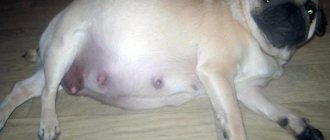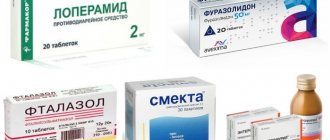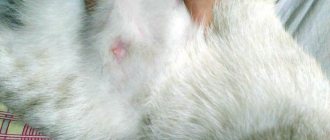Proper feeding of a nursing bitch that has given birth is the key not only to her health, but also to the well-being of the entire litter. That is why every owner, especially if he has witnessed the birth of puppies for the first time, should know what to feed the dog after birth.
The diet of a lactating bitch determines the quality of her milk, but even if, after giving birth, the dog for some reason refused to feed the puppies, it is important to restore the body that was damaged after pregnancy. It is important to understand that the period of gestation of puppies is not only a natural process, but also a lot of stress for any dog. Therefore, today we will discuss how to create a diet suitable for a bitch who has given birth during the postpartum period, during lactation.
What to feed your dog after giving birth?
How to feed a bitch immediately after the end of the birth process?
Often, dogs that feel the moment of labor approaching refuse food in advance, so as not to create unnecessary heaviness in the intestines and not be distracted from the process. When a dog has already given birth, she is busy taking care of the puppies, and the owner has a logical question: “Does the animal need to be fed now and what should I offer it?”
Instinct forces the new mother to eat the placenta of each puppy, in the usual language - the placenta. In addition to the fact that this is how wild dogs previously “covered their tracks” of childbirth, preventing predators from smelling attractive odors, this way they also refreshed themselves after the grueling and painful process of childbirth. Under no circumstances should a bitch be prohibited from eating the placenta, although there is no danger of attack by predatory animals.
Dogs usually free the puppies from the placenta themselves.
The fact is that the afterbirth contains vitamins, microelements and a large amount of protein that the dog needs to maintain strength and produce milk, rich in substances necessary for puppies. The placenta contains hormones that provoke the production of colostrum, that is, eating it is a kind of signal: “The puppy has been born, you need to feed it!”
Dog's afterbirth
The only thing is that with a large litter (more than ten puppies), eating all the placenta can cause an upset stomach in the bitch. In this situation, you need to offer the animal clean water and also give an adsorbent (for example, activated carbon, one or two tablets for every ten kilograms of weight). However, there is no need to force the dog to drink, or to persuade the dog to eat - it would be correct to offer the first food four to five hours after the birth of the last puppy, when the bitch has calmed down, licked and fed all the children. Below we will tell you exactly what food you can give your dog after giving birth.
Clean, cool water should always be available to the dog.
General data on the nutrition of a dog that has given birth
Typically, the lactation period in dogs lasts about five to six weeks, and the functioning of the mammary glands increases already a couple of weeks before birth. Veterinarians have been studying the bodies of lactating dogs of different breeds for many years to determine whether such a diet is suitable for bitches at different stages of feeding their offspring.
Dogs cannot produce or store most nutrients, vitamins and minerals in their bodies unless the animal receives them through food. Accordingly, these necessary substances will not be in the milk; more precisely, the puppies will first “suck” them out of the mother’s body. If the diet is poor or improper, the bitch will suffer first; after a short time, the negative consequences will affect the entire litter. To prevent this from happening, the owner must understand the basic principles of feeding the dog during the puppy feeding period.
Properly fed bitches grow strong and healthy puppies.
Natural nutrition for a nursing dog
It is important to understand that you cannot change an animal’s type of nutrition unexpectedly, especially if we are talking about a dog that has given birth, whose body has already suffered stress. Therefore, if the bitch ate natural products before giving birth, you need to keep this option, making some additions.
It is on a natural diet that it is important to focus on what time period has already passed after childbirth. The basis of the diet will continue to be fresh meat or lean sea fish, poultry, offal, vegetables, lactic acid products, and herbs.
Depending on the week of lactation, nutrition will be adjusted
Table 1. Feeding the dog in different weeks after birth
| How much time has passed? | What to feed? |
| The first week after the birth of puppies | For the first two to three days, the bitch may have no appetite, but every five to seven hours you need to offer the dog food and make sure that she eats at least a little. At this stage, you can give your dog pureed meat and vegetables, kefir, cottage cheese, and lean fish. When the appetite is restored and returns to normal, the bitch is fed in small portions five to six times a day. The dog’s diet certainly includes meat (veal, rabbit, turkey, chicken), offal (liver, lung, brains), fish (low-fat sea fish), and calcined cottage cheese. The first five to seven days after birth, you do not need to offer your dog fruits, herbs and vegetables, so as not to provoke allergies and stomach upset. |
| Second or third week after the birth of puppies | The main feeding remains the same (meat, poultry and offal, sea fish, dairy products). Grated vegetables, berries, fruits (carrots, cauliflower or broccoli, zucchini, apples and pears, pumpkin), chopped greens, and eggs are returned to the animal’s diet. The dog is fed four times a day; if the litter consists of three to four puppies, its pre-pregnancy daily food intake is doubled; if there are more than eight puppies, it is tripled. |
| Fourth to sixth weeks of feeding | At this stage, the puppies are introduced to complementary foods; accordingly, the number of feedings to the mother is reduced to three per day. The nutrition remains the same, only the portion sizes are reduced. When the bitch stops feeding the last puppy, she is given a fasting time. On the first day of weaning, the dog is given a limited amount of liquid and about a quarter of the usual daily food intake. On the second day, the dog receives a third of the usual portion, then half. This will drain her milk. On the fourth day, nutrition returns to pre-pregnancy norms. |
When the puppies begin to receive complementary foods, the mother's portion is reduced
Vitamin supplements for the bitch after giving birth
During pregnancy and lactation, the bitch should receive not only natural products, but also some vitamin and mineral supplements. The fact is that regular food contains the amount of nutrients that an adult animal needs. When a dog is nursing a litter, it requires more resources.
Table 2. Additives to dog food after birth
| Name | brief information |
| "Tsamaks" | The composition includes phosphorus, sulfur, magnesium, potassium, calcium, copper and other substances important for the dog’s body. The drug improves the animal’s immunity and removes toxins. |
| "Tetravit" | Contains vitamins A, E, D3 and F. The drug has an antirachitic effect, promotes the metabolism of calcium and phosphorus in the body, increases the content of vitamins in the blood, regenerates epithelial tissue, and increases resistance to infections. |
| "Gelakan Baby" | A vitamin-protein-mineral cocktail that has a beneficial effect on the formation of the skeleton of puppies, and also protects the joints, ligaments and bones of a nursing dog from calcium leaching. Contains selenium, collagen and vitamins E. |
| "CalciDi" | Contains the necessary amount of calcium and phosphorus necessary for richness of milk. The drug must be administered from the second half of pregnancy so that the skeleton of the fetus is formed correctly and the bitch does not waste her own reserves of nutrients. |
Excel Daily Multivitamin | A complex of vitamins and polyminerals necessary for every animal. The composition includes minerals, calcium, phosphorus, water-soluble and fatty acids, B-group vitamins, linoleic acid. |
Important point! Before introducing the above-mentioned drugs into the diet of a nursing bitch, it is necessary to visit a veterinarian and discuss with him the need for a particular supplement.
A nursing bitch should get vitamins not only from food
Immediately after birth
You should not offer food immediately after giving birth, since the pet has its own way of starting the active work of the body and replenishing its supply of nutrients.
The fact is that after each puppy, the bitch also gives birth to an afterbirth - a sac in which the baby developed. Outwardly, this place looks like a wrinkled small piece of liver, which the bitch eats to replenish the necessary vitamins and microelements. At this point, owners are faced with a problem not found in the wild.
The fact is that untamed dogs often have more than 4 puppies, usually 2-3. Accordingly, 2-4 placentas completely solve the problem of postpartum nutrition without overloading the digestive system.
However, domestic dogs often produce more offspring. Allowing so many “places” to be eaten means giving the animal too large a dose of hormones and substances, which is also dangerous. Taking everything away means not providing material that is important for initial milk production and rapid recovery.
Many owners choose a middle ground, feeding the bitch 3-4 placenta during childbirth and removing the rest. Overeating afterbirth can cause severe diarrhea for several days.
A dog fed with a natural “energy bar” will be full for 5-6 hours, so there is no need to feed it additionally at that time.
Once the entire procedure is completed, you can gradually restore nutrition, which during this period is subject to special rules:
- Maximum liquid. To ensure that the required amount of milk is produced without the mother suffering from dehydration, thoroughly feed her with fresh filtered water. If an animal has an attack of diarrhea, you should pay special attention to water, as its amount in the body will quickly decrease.
- Let's look at the condition. If the dog is severely emaciated, has diarrhea or complications, then it is better to temporarily switch the puppies to a substitute for bitch milk or goat milk.
- Products must be quickly digestible and sufficiently moist.
- It is worth preparing rice porridge in advance, as it has a strengthening effect and will help cope with diarrhea, and its high calorie content will give additional strength for recovery.
- Avoid dry food or heavily soak it from the second half of pregnancy. The fact is that granules are a dried concentrate that requires a lot of liquid to acquire its full form. If you feed a dog that has just given birth to such granules, they will draw out all the water and interfere with the formation of milk, even with enough drinking. Most owners prefer to switch their pets to completely natural food for a while to avoid such problems.
- Fish and meat are temporarily excluded from the diet, as they take too long to digest.
In the first week, nursing mothers can be given:
- Offal. The best choice is liver and heart, well-cooked and turned into pate.
- Vegetables pureed.
- Hard-boiled eggs or scrambled eggs. At the same time, the important part is the protein, but it’s better not to overdo it with the yolk, giving one every few days.
- Dairy products. Especially calcified cottage cheese with a fat content of no less than 5% and no more than 9%, kefir, natural yogurt without additives.
- Cereals.
- Dietary low-fat broth.
- Milk should be given carefully and carefully monitoring the consequences. The dog may take it with a bang, or it may get an upset stomach, even if such a reaction has not been observed before.
Dry food for a postpartum dog
If a dog has been eating dry industrial food all its life, it makes no sense to switch it to a natural diet before or after giving birth. Today, pet stores offer holistic and super-premium foods that perfectly cover all the needs of a bitch after giving birth.
In the second half of pregnancy, the bitch should be gradually switched to food from the “For pregnant and lactating” line; if the desired brand does not produce this type of food, the dog is given dry food for the youngest puppies (usually the line is called “Starter”). Such feeds have an optimal protein content (24-27%) and an increased content of vitamins, minerals and micro-macroelements.
Starter food for mother and large breed puppies
Important point! In order for a dog to digest and assimilate any of the dry industrial food offered to it, a large amount of moisture is required, so it is better to give the giving birth to food that has been previously soaked in cool boiled water. This feeding method is used in the first two to three weeks after birth (you can replace dry food with wet food from the same line).
Despite the fact that dry food covers the needs of both bitches and puppies, it is better to play it safe and add fermented milk products (cottage cheese, kefir), as well as supplements with vitamins and minerals, to the diet of a nursing dog. This must be done after first coordinating the actions with a veterinarian.
Grown-up puppies can receive the same food as their mother
Lines of dry food suitable for dogs after childbirth
Even if the animal was fed budget food before pregnancy, as soon as the owner learns about the replenishment, he should smoothly transfer the dog to a higher quality brand. The Russian pet market offers dozens of dry food of the “super-premium” and “holistic” classes. Here are some options that are good for pregnant and postpartum dogs:
- “Royal Canin Starter” for mother and puppies (variations “Mini”, “Medium”, “Maxi” and “Giant” depending on the breed).
- Hill's Pappy for all breeds.
- “Pro Plan Performance” (variations “Small” or “Large” depending on the breed).
- "Grandorf Pappy" for all breeds.
- Monge Mini Starter.
- "Farmina" for pregnant and lactating bitches and puppies.
- "Akana Pappy and Junior" for all breeds.
Do not mix dry food and natural food.
Norm and feeding regime for a nursing dog
You can tell if the bitch has enough food by the behavior of the puppies: if they behave calmly, look healthy and well-fed, it means their mother is receiving adequate nutrition. If puppies behave restlessly, are unhappy, constantly lie near their mother or begin to lose weight, it is likely that they do not have enough milk, which means that food portions need to be increased.
If a dog is feeding, for example, 4 puppies, the portion is increased by 1.5 times, if there are 8 of them, by 2 times. Newborn babies are fed every 2 hours for the first week, and once every 3 hours at 2-3 weeks. At the age of 1-2 months, the number of feedings decreases to 5, at 2-3 months - to 4. Puppies up to six months are given food 3 times a day, adults - twice a day (sometimes the portion is divided into 3-4 times).
What to feed your dog after giving birth, when the difficult months of bearing puppies are behind you. After all, the animal burns more energy to feed its babies, which means the diet must be balanced and healthy. The quality and fat content of the milk produced directly depends on this. A lack of vitamins and microelements slows down the growth and development of puppies and exhausts the mother.
Improper nutrition is a threat to dogs and puppies
Against the background of poor, inadequate nutrition, a measly bitch can develop a disease leading to death - eclampsia. Also, improper nutrition is fraught with digestive disorders in a dog (diarrhea or constipation), lethargy, loss of milk, and abandonment of puppies. Also, an incorrectly selected diet can cause skin diseases in your dog, including baldness.
The bitch who gave birth already has a reduced immune system, and if the owner does not support the pet in such a difficult time, the dog can become seriously ill. The poor health of the bitch steadily affects the puppies, and in the worst case, both the mother dog and the entire litter may die.
Raising puppies takes a lot out of a dog's health.
If the owner is experiencing pregnancy and the postpartum period in a dog for the first time, he should consult with a veterinarian or an experienced breeder. Experts will tell you what to pay attention to.
Important point! A healthy nursing dog, which receives all the substances it needs from food, behaves calmly, there is no exhaustion or severe deterioration of the coat, the dog’s appetite and stool are normal.
The behavior of puppies is also an indicator of the health of the nursing mother and the quality of her milk. After a meal, babies should fall asleep peacefully, without squeaking or fussing. The owner must weigh each puppy daily: if the entire litter regularly gains weight and develops correctly, then we can say that the feeding diet is suitable for both the nursing bitch and her puppies.
Newborn puppies are weighed every day and the results are recorded for control.
Nutrition for eclampsia in a dog that has given birth
Postpartum toxicosis in dogs, accompanied by eclampsia, is a deadly condition. Typically, small dogs are at risk: toy terriers, Yorkshire terriers, Spitz. The disease is associated with a severe lack of calcium in the body.
Symptoms of eclampsia:
- the dog suffers from tremors, convulsive manifestations;
- the animal’s coordination is impaired, its gaze is unfocused;
- the pulse quickens, breathing becomes intermittent;
- the dog cannot be in the light, tries to hide in a secluded place;
- the animal whines for no reason, is worried;
- lack of appetite, refusal of water;
- bitch ignores puppies.
Miniature dogs are prone to developing eclampsia
The owner of a dog that has developed eclampsia must act quickly: five drops of valocordin are poured into the animal’s mouth, then a 10 percent solution of calcium gluconate is forcibly given (2 milliliters per kilogram of weight). Calcium can also be administered intravenously or subcutaneously - for this it is better to contact a veterinary clinic.
If a dog has a tendency to eclampsia, ten days before giving birth, fish and meat, including broths, are completely removed from its diet. After giving birth, the animal must take food and water; if it refuses, the bitch is force-fed and watered. Having consulted with your veterinarian in advance, you should start giving your dog a good calcium supplement two weeks before delivery.
Calcium is the most important element for pregnant and lactating bitches.
Features of feeding lactating dogs
Everything that the bitch eats ends up in her milk, one way or another. And in the first place is not so much the quantity as the quality of milk. And the peculiarities of feeding depend on its maintenance. So, nursing dogs need food that contains:
- a lot of calcium;
- easily digestible proteins;
- carbohydrates;
- fats;
- minerals.
And after consulting with a veterinarian, a suitable vitamin complex is selected for the dog, which supports lactation and restores the health of the “mommy”.
Postpartum diet. After giving birth, it is imperative to feed the bitch with water-based porridges: oatmeal, buckwheat and wheat, and the cereal should be heavily boiled. Dairy products such as cottage cheese, cheese or kefir are needed.
Attention! Until at least 6 days have passed after birth, the dog should not be fed raw vegetables, as this will cause diarrhea in the puppies.
What and how to feed a dog after giving birth depends on the period :
- in the first week: porridge, fish products and cottage cheese;
- in the second week: meat broth, but there should be no bones in the food, pieces of raw meat;
- in the third week: during this period you can dilute the diet with vegetables and bone meal, mineral mixtures will work well;
- in the fourth to sixth week: the amount of food for the dog decreases (puppies will soon be switched to complementary foods), but the calorie content should not decrease.
Requirement for vitamins and microelements. During the postpartum period, the bitch needs a special amount of vitamins in order not only to restore body functions and support immunity, but also to transfer microelements necessary for development to the puppies through milk.
Required:
- vitamins of group A (they are fat-soluble, should not be given in large doses);
- vitamins B1, B2, B9, B12 (they are water-soluble and do not accumulate in the body, so they can be given frequently);
- vitamins C (water soluble, but the dose should be moderate);
- vitamins of group D in large quantities (responsible for the production of calcium).
Is it possible to give dry food?
Yes, if it is food specifically for nursing dogs. Why is it important? Because such food contains a balanced amount of mineral supplements, microelements and vitamins that are needed for “mother” and puppies.
If this is premium or superpremium class food, then separate vitamin and mineral supplements are not needed. In the case of economy class food, they are necessary. If mommy develops an allergy, she can eat special hypoallergenic food.
Important! If a lactating bitch eats dry food, then regardless of its class, she needs plenty of fluids and an increased amount of dairy products.
Diet for eclampsia
The disease occurs from an acute deficiency of calcium in the body. The symptoms are terrible, develop quickly, and cannot be confused with any other ailment:
- body temperature increases sharply and strongly;
- heart rate increases, shortness of breath begins;
- balance is lost, coordination is lost;
- the dog has a darting look, barks for no reason, does not pay attention to puppies and is worried;
- loss of appetite, the animal does not drink, its pupils are dilated;
- paw tremor begins, which quickly turns into convulsions (the dog remains conscious).
If these symptoms occur, the bitch must be taken to the doctor immediately, otherwise she will go into a coma and then die. You can't hesitate.
At risk are:
- dogs of small breeds, and the smaller, the higher the risk;
- malnourished;
- dogs that have problems with the thyroid gland.
If the bitch is prone to eclampsia, you need to carefully monitor the diet so that the disease does not recur. Give premium and superpremium food that is specially balanced, because if there is an excess of calcium, the animal will get sick again.
Summarizing
Like all mammals, in dogs there is a very strong connection between the diet of the nursing mother and the well-being of the puppies. Therefore, an owner interested in maintaining the health of his pet and helping her feed and raise healthy puppies should focus on a balanced diet. During this period, there is no need to skimp when choosing food or food for the dog - it should receive all the necessary substances in the right quantities, which cannot be achieved by skimping on good healthy food.
Stimulation of milk production
Owners of Labradors, Yorkies, Spitz and German Shepherds are often faced with the fact that such dogs do not have enough milk for puppies. To avoid this problem, you need to feed your pet properly.
First postpartum meal
Dairy products are added to the diet in the first week after birth.
It is better not to touch the dog for the first 5-6 hours after the end of childbirth. Only after this can you think about what you can give from food. At first it is better to give liquid food without meat. The next day, porridge and fermented milk products are added to the diet.
First week
Despite the fact that in the first seven days after birth the animals' appetite begins to normalize, they will have to give up meat products. Instead, the following foods are added to the diet:
- cottage cheese;
- kefir;
- milk;
- soups and broths.
Additional Information! In the first week, it is better not to give your dog dry food or other heavy food.
Second week
Many dog breeders are interested in how to increase a dog’s milk supply in the second week, since during this period newborn puppies begin to actively feed. You can add boiled meat to their diet. It should also be given raw in small quantities. Offal, which is offered in small portions, will also be beneficial.
Third and fourth week
Raw meat - added no earlier than the second week.
By the beginning of the third week, the dog can already eat any food. However, despite this, she needs to be given more natural food. It contains many nutritional components that a pet needs after giving birth. The bitch should be fed raw meat, vegetables and dairy products.











